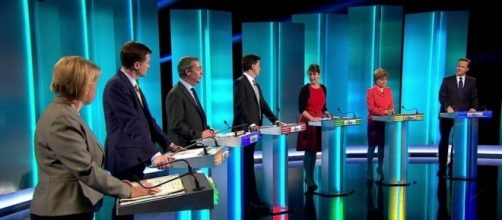As campaigning continues for the upcoming June General Election, major TV broadcasters face a big decision of their own. Can they agree on holding TV election debates to a primetime audience?
Earlier this week, a spokesperson for the Labour party confirmed that Jeremy Corbyn has no intention in taking part in debates if they happened without Theresa May. The current Prime Minister ruled them out almost as quickly as it took for her to trigger the shock election a fortnight ago.
Both the BBC and ITV have already indicated they are ready to stage TV Debates but will there be any point if the major political parties are missing from the stage?
2010 & 2015 success
A proposal for leaders' debates in the run-up to General Elections in this country had been mooted for many years before it actually happened. In fact, they were first spoken about in the 1960s. However, it became very difficult to get all sides to agree to hold them. The Prime Minister was often reluctant to take part. John Major was the only recent PM to resoundingly agree to them in 1997 but the broadcasters couldn't agree on a successful format with the three major political parties.
Finally, an agreement was made between the parties and major broadcasters (BBC, ITV and Sky News) to host debates in the run-up to the 2010 General Election. A peak audience of 10.3 million was achieved for the very first debate, held by ITV in Manchester in April 2010 when Nick Clegg, David Cameron and Gordon Brown went head-to-head in a passionate and intriguing 90-minute debate on domestic policies.
The general consensus was Clegg was the main winner of the 2010 debates and although it managed to get him into government via a coalition, the Liberal Democrats actually lost seats they'd gained five years earlier.
In 2015, audience figures went down to around 7.5 million but that was still a healthy return. There was just one debate, again held by ITV with the leaders of UKIP, the SNP, the Green Party and Plaid Cymru invited to join. Other broadcasters held versions without all party leaders. For example, the BBC's 2015 version didn't have Cameron or Clegg but the other five party leaders took part. Nicola Sturgeon came out pretty well of the 2015 debates and they certainly helped the SNP's almost complete whitewash of the Scottish seats and also, brought her name strongly into the political spectrum.
38% of voters have previously considered the debates to influence their voting intention, so if they didn't happen in 2017, there is a danger that some British people won't bother turning up at polling stations to vote.
May not interested
Less than 24 hours after calling the shock General Election for 8 June, Theresa May told BBC Radio 4's Today programme that there would be no TV debates this time around. She said: "We won't be doing television debates. I believe in campaigns where politicians actually get out and about and meet with voters."
She was immediately criticised for her decision. Mr Corbyn was one of her most vocal critics whilst Liberal Democrat leader Tim Farron urged broadcasters to leave a blank platform on each stage and make the point that the Prime Minister was invited to turn up but declined the chance to put her policies across to a primetime audience.
Now it seems like Corbyn has had a change of heart too. His decision is thought to be based on the fact that the choice the people have is to vote for either a Conservative or Labour government. Therefore, it would make no sense for him to debate with the other minor parties. Corbyn is not Labour's most envied leader. He saw off a challenge for his leadership last summer after the EU referendum and hasn't always driven confidence from the British public. This was his chance to maybe gain undecided supporters, especially in the likely absence of the Prime Minister.
Can it work without May and Corbyn?
Time is running out for the TV debates to take place in this election. The UK goes to the polls in just under six weeks' time and with campaigning already well underway, it looks like the traditional campaigning for votes pre-2010 will dominate the background to this election.
ITV have already indicated they will hold a debate with Julie Etchingham hosting, as she did two years' ago. Sky News haven't announced anything whilst the BBC are weighing up their options. Even if they didn't happen, it is expected for both May and Corbyn to do a Q&A session of Question Time with a live studio audience but not debate head-to-head.
Either way, the TV debates have been a popular concept over the past two elections and it does get the nation talking, even if their political knowledge is not heavily detailed. It would be a shame if they don't happen but that is looking more likely to be the case.


